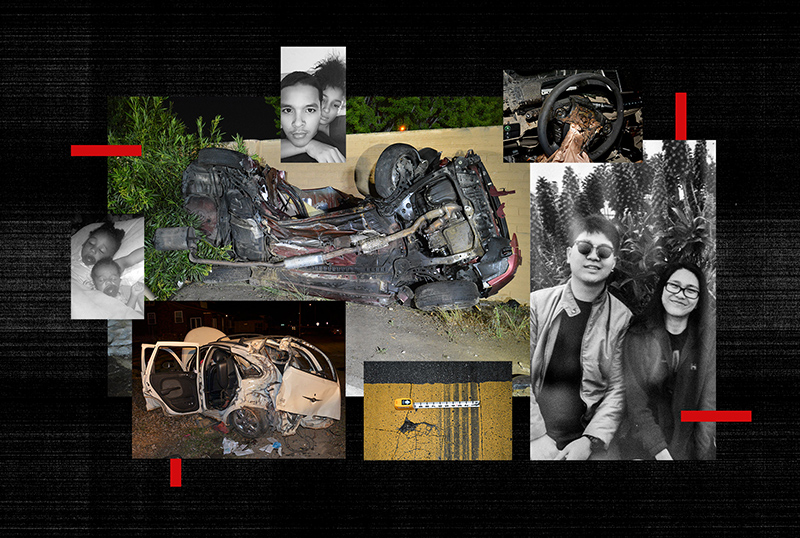2025 Hillman Prize for Newspaper Journalism

Jennifer Gollan and Susie Neilson
In the movies, a police car careens through crowded city streets and mangled vehicles pile up, but the collateral damage is almost never mentioned. In real life, those chases have fatal consequences. But as the San Francisco Chronicle discovered, no one is accurately tracking the casualties, and few are working to change policies that put the public at risk.
Over the course of a year, the Chronicle built five databases. Investigative reporter Jennifer Gollan and data reporter Susie Neilson discovered that between 2017 and 2022, more than 3,300 people died because of police chases. That number represents hundreds more lives than the statistics gathered by the National Highway Traffic Safety Administration (NHTSA).
Researchers, journalists, and other organizations rely on the NHTSA, but the agency updated its data when presented with the Chronicle’s findings.
In their seven-part series “Fast and Fatal,” Gollan and Neilson investigated the devastating fallout of police chases. They interviewed grieving families, crash survivors, and law enforcement officials. They discovered permissive policies across police departments, which allow officers to make judgments in the moment, even without a supervisor’s approval. Sometimes, fatal crashes begin over minor traffic violations. Sometimes, no crime has been committed.

Police pursuits, the Chronicle found, happen disproportionately in Black neighborhoods, and often bystanders are injured or killed. Officers rarely are held accountable.
A 12-year-old boy was killed after a chase involving a Georgia State Patrol officer. That officer, conducting a traffic stop, asked the driver to hand over his license and step out of the vehicle. The driver refused to leave the car, asking what he’d done wrong. Then police smashed a car window, and the driver fled, while his teenage son and his 12-year-old friend called 911. The younger boy’s father later said: “It’s outrageous that a 12-year-old boy was killed by law enforcement to give a guy a speeding ticket, not for a violent crime or anything. And no one has anything to say about it.”
A missed turn signal led to the deaths of Precious and Philip Nievas. They were almost home in San Jose, Calif., when another driver fleeing a sheriff’s deputy blasted through a red light at 97 mph and T-boned their car. The brother and sister, 22 and 25, died at the scene, victims of severe blunt-force injuries.
Despite the growing death toll from these accidents, there is no binding national standard governing when and how police should chase suspects. The Chronicle reviewed more than 100 departmental policies, and many allow officers to justify chases for almost anything. And even when they flout policy, and people die or are injured, they escape reprimand or punishment, Gollan and Neilson discovered.
“Fast and Fatal” exposed the profound injustice of police pursuits and transformed the nation’s understanding of flawed practices. New York University School of Law’s Policing Project has now developed model national rules for state lawmakers across the country.
Jennifer Gollan is an investigative reporter at the San Francisco Chronicle. She joined the Chronicle from The Center for Investigative Reporting, where she led national investigations that appeared in The Associated Press, The Guardian US and Politico Magazine. She also worked with PBS NewsHour and Al Jazeera English’s “Fault Lines” on special television reports and documentaries.
Her investigations have prompted sweeping changes in federal law that expanded the power of local and state police and prosecutors to crack down on abusers with illegal guns; congressional hearings and new legislation to thwart labor abuse in elder care homes; and a review by the Pentagon and federal legislation to protect workers building warships for the U.S. Navy.
Projects she led have received various honors. In 2022, she received the Robert F. Kennedy Journalism Award and was nominated for an Emmy Award for “When Abusers Keep Their Guns,” an investigation that exposed how perpetrators often kill their partners with firearms they possess unlawfully. Her work has also earned a national Emmy Award, a Hillman Prize, two Sigma Delta Chi Awards from the Society of Professional Journalists, a National Headliner Award, a Gracie Award and two Society for Advancing Business Editing and Writing awards.
Susie Neilson is an investigative reporter with the San Francisco Chronicle. Her work has prompted numerous changes to local and state regulations in California, including a statewide ban on a debunked lie detector technology used to interrogate prisoners. Her stories have earned recognition from the Online Journalists Association and the Indigenous Journalists association, and have been published in the New Yorker, the Atlantic and NPR. She is a graduate of UC Berkeley and Northwestern University.

